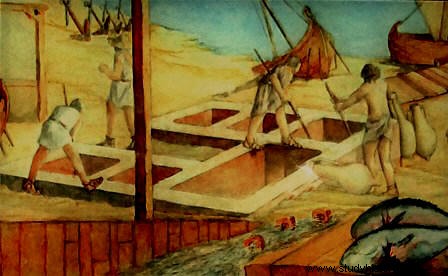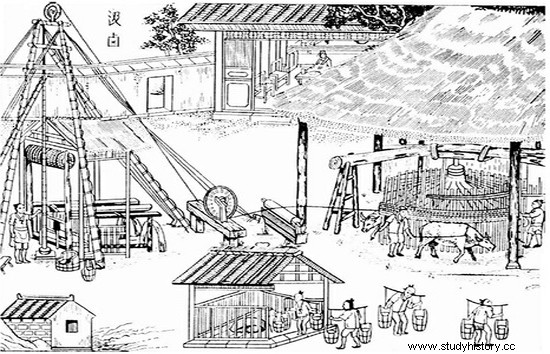The importance of salt in ancient times lay in its use as a preservative for perishable foods, as well as a condiment. In fact, the term salary derives from the Latin salarium (of salt), because the workers received part of their fees in salt. Pliny came to write…
Nihil esse utilius sale et sole (There is nothing more useful than salt and sun)

So, given its vital importance, the different forms of government in each place established absolute control over the production, exploitation and trade of salt, originating what many consider to be the first monopoly in history. China's salt tax is thought to have enabled the construction of the Great Wall. The coastal populations had an easy time obtaining the precious treasure through the sea salt pans:extracting water from the sea and letting it rest in shallow pools until the sun evaporated the water. The brine obtained was placed in containers and allowed to dry for subsequent commercialization, already crystallized.
In inland towns it was not so easy but they also had their methods to obtain it. In the so-called inland salt pans, the same method was followed as in the coastal ones, but using water from springs whose current had passed through underground salt deposits. Another method of obtaining, also based on underground water currents and that required certain technology, was drilling. And the necessary technology would be “Made in China ”. In the 5th century BC The Chinese have already managed to reach almost 100 meters deep with a drilling system based on huge bamboo drills with different metal tips depending on the terrain to be drilled. The underground water was raised to the surface and there heated in pots to evaporate the water and obtain the salt. The problem was that, sometimes, those drillings disturbed the spirits of the Earth and sent out flames of fire that killed the miners. These divine mosqueos already puzzled the Greeks when a shepherd found a perpetual flame coming out of a fissure in a rock on Mount Parnassus and they decided to build a temple in honor of the god Apollo that would house the Oracle of Delphi. Geological studies carried out in the 20th century have shown that small amounts of gases such as methane or ethane escape through the fissures in the rocks of that place, which could be responsible for the fortune teller entering a trance - we leave the predictions for another time and place. Both this Greek eternal fire and the Chinese moody spirits were nothing more than bags of natural gas . We will leave aside the Greek case, probably caused by lightning, and we will focus on the Chinese case.

The Chinese soon learned to control these spirits and humanize them or, rather, use them as fuel to heat the pots used to obtain salt on the surface. Later, they channeled the natural gas through bamboo cane pipes to deliver the new clean energy -barely polluting- to nearby towns and use it for various purposes (there is data on the manufacture of methane lamps by filling bladders with natural gas). And this is how, thanks to salt, natural gas began to be used as energy and the first gas pipeline was built .
Source:Inventions of the Ancients
